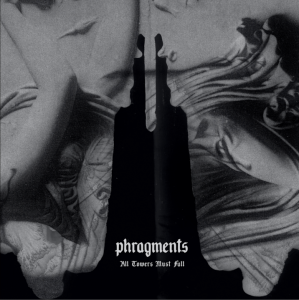
Phragments, the main outfit of Slovakian artists Matej Gyárfáš and Nenad Branković, return with their fifth studio recording, after 2013’s New Kings And New Queens. That last one did slightly differ from the first recordings, for being less martial and orchestral in nature, yet rather Drone-oriented than before. And that indeed is sort of the direction this album goes on once again. All Towers Must Fall is limited to 250 copies in black vinyl with great artwork (the cover design was created by Nenad), and this time too, everything has been mastered by no one else but John Stillings at his Steel Hook Audio.
The six compositions, which last in between six and nine minutes (total running time: forty-six minutes), and with the title track, everything starts at least as intense, overwhelming and magisterial as ever before. Massive droning melodies and ritual ambiance are like the spine-structure of a mesmerizing journey through spheres of the unknown, the untold, the unexplored. And we’re part of the expedition that is able to explore those sub-terrestrial and post-dimensional regions…
Compared to the past, Phragments go deeper into the subconsciousness, leaving the martial and neo-classical structures behind, and delving deeper into the world of Dark Ambient / Drone / Space-Industrial. It’s little harsher and less subtle, heavier in sound and more extravert than before, yet the initial bombast and orchestrations are still like the necessary air to breathe… Instead of the victorious atmosphere of Old, a rather desolate integrity seems to un-colour the richness of this material. And it might seem quite strange, but at the same time there is an increased ‘richness’ in essence as well as a minimal soberness. The latter gets expressed especially through the monumental nihilistic droning passages, much colourless than before. Some pieces are even the opposite of the past when it comes to flair and continuation – this time replaced by moments of sit-back tranquillity and even a form of morning and grief.
In essence, however, the basic structures remain the same, and I cannot say, personally, whether I prefer the older recordings or this one. Actually, the organic evolution is something one cannot but appreciate. There’s more of an apocalyptic soundtrack going on, or even a post-apocalyptic experience, when all (human) life could have faded away (oh, if only…). But it surely acts like an organic response to the martial pre-extinction hymns of last century’s majesty!
